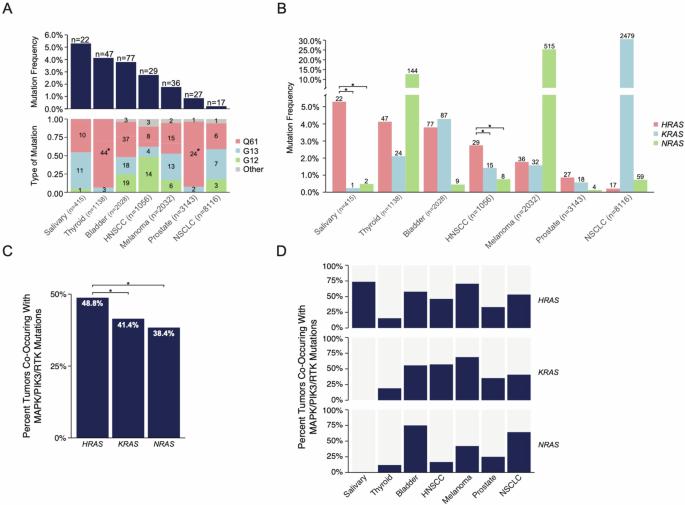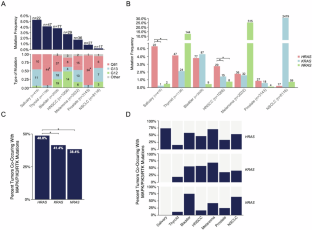HRAS突变癌症中的合作基因组病变可预测法尼基转移酶抑制剂的耐药性。
IF 6.9
1区 医学
Q1 BIOCHEMISTRY & MOLECULAR BIOLOGY
引用次数: 0
摘要
在针对 HRAS 突变肿瘤的法尼基转移酶抑制剂(FTIs)的临床开发中,不同癌症类型的反应各不相同。共存突变可能会影响反应。我们的目标是发现HRAS突变肿瘤特有的合作基因事件,并研究它们对FTIs敏感性的影响。利用 MSK-IMPACT 和 Dana-Farber 癌症研究所基因组证据肿瘤信息交换数据库中的靶向测序数据,我们确定了主要在 HRAS 突变型癌症与 KRAS 突变型或 NRAS 突变型癌症中观察到的组合突变。与 KRAS 突变(41.4%)和 NRAS 突变(38.4%)的癌症(p G13R 被转染到 "无 RAS"(Kraslox/lox/Hras-/-Nras-/-RERTert/ert)小鼠胚胎成纤维细胞(MEFs)中,使未转染的 MEFs 对替尼法尼敏感。Pten或Nf1缺失形式的突变和Pik3caH1047R转导导致HrasG13R转导的MEF在有或没有KrasWT的情况下对替尼法尼产生抗性,而BrafG466E转导仅在有KrasWT的情况下对替尼法尼产生抗性。替尼法尼和MEK抑制剂联合治疗可使细胞在所有情况下对替尼法尼敏感,包括在具有PI3K通路组合的MEF中。HRAS突变的肿瘤表现出线型依赖的MAPK或PI3K通路改变,从而对替尼法尼产生耐药性。对于HRAS突变肿瘤,联合使用FTIs和MEK抑制剂是一种很有前景的策略。本文章由计算机程序翻译,如有差异,请以英文原文为准。


Cooperative genomic lesions in HRAS-mutant cancers predict resistance to farnesyltransferase inhibitors
In the clinical development of farnesyltransferase inhibitors (FTIs) for HRAS-mutant tumors, responses varied by cancer type. Co-occurring mutations may affect responses. We aimed to uncover cooperative genetic events specific to HRAS-mutant tumors and to study their effect on sensitivity to FTIs. Using targeted sequencing data from the MSK-IMPACT and Dana-Farber Cancer Institute Genomic Evidence Neoplasia Information Exchange databases, we identified comutations that were observed predominantly in HRAS-mutant versus KRAS-mutant or NRAS-mutant cancers. HRAS-mutant cancers had a higher frequency of coaltered mutations (48.8%) in the MAPK, PI3K, or RTK pathway genes, compared with KRAS-mutant (41.4%) and NRAS-mutant (38.4%) cancers (p < 0.05). Class 3 BRAF, NF1, PTEN, and PIK3CA mutations were more prevalent in HRAS-mutant lineages. To study the effects of comutations on sensitivity to FTIs, HrasG13R was transfected into “RASless” (Kraslox/lox/Hras−/−/Nras−/−/RERTert/ert) mouse embryonic fibroblasts (MEFs), which sensitized nontransfected MEFs to tipifarnib. Comutation in the form of Pten or Nf1 deletion and Pik3caH1047R transduction led to resistance to tipifarnib in HrasG13R-transfected MEFs in the presence or absence of KrasWT, whereas BrafG466E transduction led to resistance to tipifarnib only in the presence of KrasWT. Combined treatment with tipifarnib and MEK inhibition sensitized cells to tipifarnib in all settings, including in MEFs with PI3K pathway comutations. HRAS-mutant tumors demonstrate lineage-dependent MAPK or PI3K pathway alterations, which confer resistance to tipifarnib. The combined use of FTIs and MEK inhibition is a promising strategy for HRAS-mutant tumors.
求助全文
通过发布文献求助,成功后即可免费获取论文全文。
去求助
来源期刊

Oncogene
医学-生化与分子生物学
CiteScore
15.30
自引率
1.20%
发文量
404
审稿时长
1 months
期刊介绍:
Oncogene is dedicated to advancing our understanding of cancer processes through the publication of exceptional research. The journal seeks to disseminate work that challenges conventional theories and contributes to establishing new paradigms in the etio-pathogenesis, diagnosis, treatment, or prevention of cancers. Emphasis is placed on research shedding light on processes driving metastatic spread and providing crucial insights into cancer biology beyond existing knowledge.
Areas covered include the cellular and molecular biology of cancer, resistance to cancer therapies, and the development of improved approaches to enhance survival. Oncogene spans the spectrum of cancer biology, from fundamental and theoretical work to translational, applied, and clinical research, including early and late Phase clinical trials, particularly those with biologic and translational endpoints.
 求助内容:
求助内容: 应助结果提醒方式:
应助结果提醒方式:


